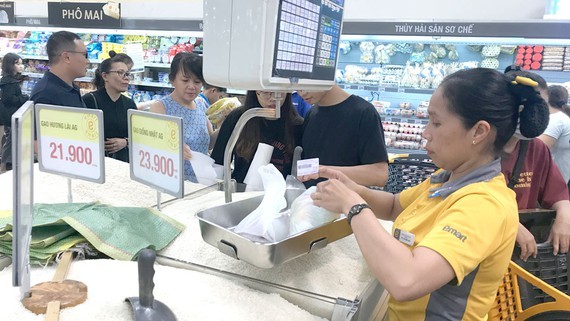
Trung An Company has just successfully exported 150 tons of ST20 and Jasmine fragrant rice in August this year at a fairly high price of US$600 per ton for Jasmine rice and $1,008 per ton for ST20 rice. According to Mr. Pham Thai Binh, General Director of Trung An Company, this is not the first time the company has exported rice to the EU, but these are the first batches of rice to be exported with import tariffs at zero percent when the EVFTA takes effect. To achieve this achievement, Trung An has done technical preparation to meet the EU market standards since 2011. It took 3-4 years for the company to improve the soil to produce clean and organic rice. Besides, Trung An must ensure the factors of origin of goods, quality of warehouses, environmental conditions, and food hygiene and safety.
Orama Asiatic pennywort (Centella Asiatica) powder of Thien Nhien Viet Import Export Company Limited is favored by many EU customers, especially those in the Netherlands. Fresh pennywort is sold for only a few tens of thousands of Vietnamese dong per kilogram, but the initiative to produce products, such as pennywort powder or pennywort juice with coconut water, has left Orama with no competitor. According to Ms. Nguyen Ngoc Huong, Director of Thien Nhien Viet Import Export Company Limited, currently, Vietnam's agricultural products do not compete much with EU domestic products due to the difference in the segment. However, to develop sustainably and exploit well the advantages of the EVFTA, the company will have to make plans for the long term and prepare to expand production. Moreover, the company also has to overcome difficulties in finding safe material growing-areas because pennywort powder, chameleon plant powder, and perilla mint powder need to meet all EU standards to be able to increase production shortly.
Discussing the advantages of Vietnamese agricultural products under the effectiveness of the EVFTA, Mr. Dang Phuc Nguyen, General Secretary of the Vietnam Fruit and Vegetables Association, said that about 94 percent of the total 547 tariff lines on fresh and processed fruits and vegetables are cut to zero percent. Of which, many fruits and vegetables are Vietnam's export strength. The EVFTA also has no restrictions on products and turnover, so there is no need to negotiate each specific product. Vietnam can export any type of fruits and vegetables to the EU, as long as that item is made in Vietnam and meets the EU standards. This is also the difference between the EVFTA and the previously-signed free trade agreements (FTAs). At the same time, it is a huge competitive advantage for Vietnamese vegetables and fruits compared to those of China and Thailand when they have not had any FTA with the EU.
Specifically, for the products that Vietnam is exporting raw, the tax rates do not change much, because they are at a low level of 0-5 percent, but for the group of processed and deeply-processed products, the tax rates will be extremely different, reducing from around 10 percent to zero percent. Therefore, to increase exports, Vietnamese agricultural products must meet the GAP (Good Agricultural Practices) standards.
Mr. Nguyen Huy, an expert from the project "High-quality Vietnamese goods - Integration standards", said that the GlobalGAP standards that have existed so far have not changed at all, meaning that the EU will not add more technical barriers to make it difficult for Vietnamese exporters. Vietnamese enterprises need to comply and be well-prepared to best meet the criteria asked by their partners. When products are successfully exported to the EU, it also means that access to other markets will be better.
Sharing his experience of conquering markets with high-end products, Mr. Pham Thai Binh said that he was not afraid to knock on doors of domestic and foreign authorities and departments to study opportunities, and specific standards for each market to satisfy even the most stringent requirements. Because, if enterprises want to expand export opportunities for their goods, this is the inevitable path for them in the context of increasingly-deep integration. The EU is a very demanding market for the group of agricultural products, in which the export shipments must be uniform, and quality must be stable, otherwise, enterprises will lose their opportunities.
























